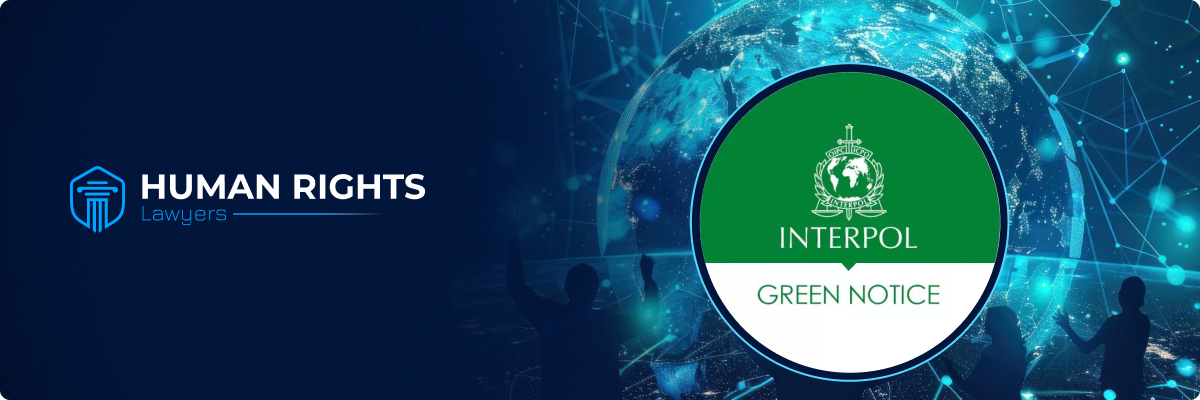Interpol Green Notice
Our legal team specializes in assisting clients who have been targeted by a Green Notice, providing guidance on how to address the notice, challenge its validity, and work towards its removal. We ensure that your rights are safeguarded throughout the process, offering expert support to minimize the impact of a Green Notice on your life and activities.
Interpol plays a significant role in international criminal law, contributing to the maintenance of security and cooperation between countries. One of the tools used by this organization is the system of notices. In the language of international law, one of these tools is known as the Interpol Green Corner or Notice. Let’s take a closer look at what this notice signifies, its purpose, and the possibility of removing the Interpol Green Notice.
What is an Interpol Green Notice?
An Interpol Green Notice is an official communication issued by the International Police to warn and alert member countries about individuals whose criminal offenses may pose a threat to public safety in various countries. The Interpol Green Notice is not an arrest warrant or a request for extradition, but rather a warning of a person’s criminal activities directed at law enforcement agencies as a notification of potential risks and for the subsequent taking of appropriate measures.
What is the purpose of Interpol Green Notices?
The primary purpose of Interpol Green Notices is to increase awareness and readiness of law enforcement agencies to respond to potential threats. This, in turn, assists law enforcement structures of other Interpol member countries in the exchange of information about individuals who have committed criminal offenses. Early notification can prevent the emergence of crimes and suppress criminal activities in other countries by promoting international cooperation.
Who receives or has access to the Interpol Green Notice?
Access to Interpol’s Green Notices is held by the National Central Bureaus (NCB) in each of the 196 countries. This creates an international network for the exchange of information and coordination of actions between Interpol and law enforcement agencies at the national level in each member country.
The information transmitted through the Interpol Green Notice can be shared with other interested parties, such as an international organization or agency dealing with security issues. As such, you can check whether you’re on the Interpol Green Notice list by contacting international legal organizations or Interpol’s National Central Bureau (NCB).
How can a Green Notice be removed?
The process of removing an Interpol Green Notice is quite complex and requires detailed preparation and legal justification. The main steps to be taken include:
- Contacting the Interol NCB: The first step is to submit a request to the Central Bureau of Interpol in the country where the notice was issued. It is necessary to justify the reasons and provide relevant evidence that would make it possible to remove the Interpol Green Notice.
- Consulting with a lawyer: Legal support at this stage is extremely important. Qualified lawyers can assist in the preparation of the necessary documentation and presentation of the case before Interpol and criminal justice systems worldwide.
- Preparing an evidence base: It is important to gather and provide evidence that proves the person does not pose a threat to public safety. This may include official documents, testimonies, and other materials proving innocence.
- Challenging the notice: If the notice is based on inaccurate data or is the result of abuse, it is necessary to prepare arguments for its challenge. This may include appealing in international instances or through diplomatic channels.
Legal Issues in the Process of Challenging an Interpol Green Notice
When challenging an Interpol Green Notice, it is necessary to focus on the following:
- Legitimacy and justification of the notice: It is necessary to prove that the notice was issued unlawfully or is based on erroneous data.
- Protection of human rights: The Interpol Green Notice should not violate fundamental human rights and freedoms enshrined in international treaties and conventions.
- Confidentiality and data protection: It is important to ensure that the personal information contained in the notice is used strictly in accordance with international data protection standards.
- International jurisdiction and cooperation: Challenging an Interpol Green Notice may require interaction with multiple jurisdictions and organizations, which complicates the process and requires coordination between various legal and law enforcement bodies.
Need Legal Advice?
If you are facing an Interpol Green Notice, it is crucial to seek qualified legal support. Our Interpol lawyers can consult you and offer an appropriate defense strategy. Legal support includes case analysis, preparation of evidence, and representation of the client’s interests in international instances. Do not delay resolving the problem—timely legal assistance will help minimize risks and protect your rights.




